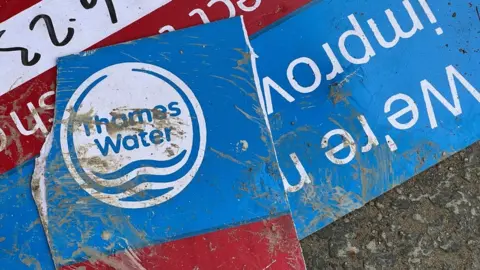Ofwat complacent over Thames Water affair - MP
 Reuters
ReutersOfwat has been accused of being "complacent" over the Thames Water affair, which has seen it lose its chief executive and face collapse over its massive debts.
The company is fighting for survival and has until early next year to stave off temporary nationalisation.
MP Sir Robert Goodwill said the regulator had questions to answer over whether it had "been asleep at the wheel" over the case.
Ofwat faces MPs on Wednesday.
Sir Robert, a Conservative MP who chairs the Environment, Food and Rural Affairs Committee, told the BBC the regulator had been "very complacent" over Thames Water.
The company is facing problems servicing its debts of £14bn, but Ofwat said earlier this week that shareholders were "reluctant" to invest and it expected the firm to request an increase in bills at the next price review.
But Sir Robert said Thames was heavily in debt and about 80% of its finances came from borrowing. "That means as interest rates have gone up, about half their debt is linked to inflation. They've had massive increases in the cost of that debt," he said.
However, he said the committee, which would also be questioning water companies on Wednesday, wanted to know where the debt came from.
Sir Robert believed the firm was taking money out in the form of debt payments, instead of dividends. "Our suspicion is that a lot of this debt is with these very funds that own the shares," he said.
The committee chairman said the MPs would want to know: "Have Ofwat been asleep at the wheel or have they just not had the powers to inquire into some of the finance structures?"
Ofwat's appearance on Wednesday will be the second appearance in as many weeks in front of politicians. Last week its chief executive David Black gave evidence to the Lords' business committee when he denied the watchdog had failed to regulate the industry well.
But he admitted there were "hard lessons to learn" and that he had been "angered" by excessive chief executive pay in the industry.
'Rather reckless'
Thames Water is not the only water company in the spotlight. The management of Southern Water is also up for scrutiny.
"It does seem rather reckless," Sir Robert said. "Southern Water's credit rating has been downgraded yet again. The owners of these companies are having put to put money in yet again. My worry is the money that we're paying as water users will be going to service that debt, rather than what we want to see, which is paying to clean up our rivers and improve sewage treatment."
However, the chair of the select committee argued a return to nationalisation was not the answer: "I can remember when water investment was way back in the queue behind hospitals and education and to be fair, we have seen massive investment in improving our infrastructure.
"The general problem with pollution is when it rains. Many older houses have the water from their roofs going straight into the sewer, which massively overloads the system, and that's something that can be addressed with storm-water tanks. It can also be addressed by people putting in water bowsers or catching the grey water and using that to flush their toilets."
Thames Water, which is due to publish its annual results on Monday, said it would be making no comment.
In a statement to the BBC on Sunday Ofwat said: "Thames Water need to develop a robust and credible plan to turn around the business and transform its performance for customers and the environment. For a long time, we have been pushing them to improve their financial resilience, including to cut debt. We will continue to safeguard customers' interests as they do that."
The BBC has also approached Southern Water for comment.